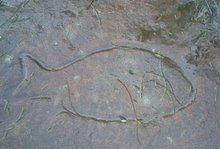Designed density or ad hoc sprawl is an issue for most places these days. A discussion wrt Boston communities here came up with the following:
"...density is the secret to creating healthier urban environments - with safer streets, better schools, more vibrant cultural and commercial activity, more efficient public transportation, nicer parks, and a less degraded environment."
"It's very much about walkability. Goods and services have to be immediately available. You have to be able to walk to them."
"A five-minute walk in a neighborhood where you feel uncomfortable is too far."
via Kottke
31 August 2005
Planned density equals quality, sub-urban sprawl equals misery.
Bikes for Manly
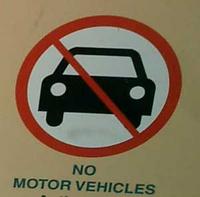 Imagine motor vehicles banned from Manly or even Sydney. Bikes everywhere, to rent with a credit card. The most efficient form of transport with zero emissions. No more fear for pedestrians or severe injuries or even death.
Imagine motor vehicles banned from Manly or even Sydney. Bikes everywhere, to rent with a credit card. The most efficient form of transport with zero emissions. No more fear for pedestrians or severe injuries or even death.
"Other cities are interested in adopting the scheme. Montpellier, Marseille, Geneva, Barcelona and even Amsterdam, the cycling capital of Europe, all sent delegations to examine it." Hello Manly council, get into sustainable innovations.
via Kottke
30 August 2005
Air bags for pedestrians
 In Europe, new design standards for cars are being proposed so that when pedestrians are driven into, the car does not immediately kill them or cause head injuries. Bonnets are to be raised above engines so they can bend on impact. Bumper bars are to be broader so that pedestrians are not immediately thrown head-first onto the engine compartment. At present, car design promotes head injuries as low bumper bars hit pedestrians' legs first knocking them off their feet so the head impacts the front of the car.
In Europe, new design standards for cars are being proposed so that when pedestrians are driven into, the car does not immediately kill them or cause head injuries. Bonnets are to be raised above engines so they can bend on impact. Bumper bars are to be broader so that pedestrians are not immediately thrown head-first onto the engine compartment. At present, car design promotes head injuries as low bumper bars hit pedestrians' legs first knocking them off their feet so the head impacts the front of the car.
Another proposal is external air bags which open on impact on the outside of the car to protect pedestrians. This would be an extra cost for motorists, who would prefer to spend the money on car sound systems, but could save many lives and prevent injuries.
In Manly there are still a large number of vehicles which are designed for war on the roads. Car-armouring such as bull bars and heavy weight ensure the survival of the toughest. The guaranteed losers of these street battles are pedestrians and cyclists, especially children. For each one of the thousands of deaths on the roads and adjacent footpaths, about 100 people are injured, often seriously and permanently.
Although in Australia, the discussion about carcinogenic diesel dust particles has finally just begun, the topic of dangerous streets has been long kept quiet. The aim of design changes is to protect living beings without air bags who dare to go out into car-dominated public places.
Where are the car-free spaces around here?
29 August 2005
200 years of care
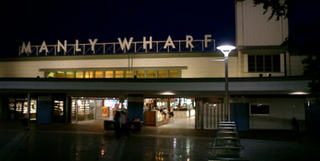 Manly is full, the infrastructure is bursting. Commercialisation of every cm for short term gain (of a few). Friendly bullies have their way in a de-regulated environment. The 'wheels of industry' can be heard all along the beach, the subs and the roads at night. Meanwhile authorities are distributing pulped forests of 'appeal' and 'education.' An ineffective way, but a good smoke-screen. But all that made this place special, its natural flora and fauna is being eradicated (still). The McMansions are not for living, but making that buck and moving on. The synergetic outcome of yet another Bondi/Miami is of no interest to the gatekeepers or the 'families'. In fact, it is fml-values that drive the bulk of this development.
Manly is full, the infrastructure is bursting. Commercialisation of every cm for short term gain (of a few). Friendly bullies have their way in a de-regulated environment. The 'wheels of industry' can be heard all along the beach, the subs and the roads at night. Meanwhile authorities are distributing pulped forests of 'appeal' and 'education.' An ineffective way, but a good smoke-screen. But all that made this place special, its natural flora and fauna is being eradicated (still). The McMansions are not for living, but making that buck and moving on. The synergetic outcome of yet another Bondi/Miami is of no interest to the gatekeepers or the 'families'. In fact, it is fml-values that drive the bulk of this development.
23 August 2005
Plundering Aquatic Reserves and getting away with it
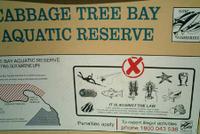 Cabbage Tree Bay Aquatic Reserve has been listed on the National Estate register since 1991. It is a 'no-take' aquatic reserve in which people are not permitted to fish by any method, destroy marine life, or collect dead or alive marine organisms, including empty shells. The Marine Pde. is a popular walkway beside this 'No Take' area on which walkers and swimmers can enjoy the biodiversity of the area.
Cabbage Tree Bay Aquatic Reserve has been listed on the National Estate register since 1991. It is a 'no-take' aquatic reserve in which people are not permitted to fish by any method, destroy marine life, or collect dead or alive marine organisms, including empty shells. The Marine Pde. is a popular walkway beside this 'No Take' area on which walkers and swimmers can enjoy the biodiversity of the area.
Right after the Manly (beach) SLSC, at Manly Point beside a sign 2 spearfishers were plundering the Reserve today at 12.30. Many walkers stopped and looked, no action.There were also swimmers near the armed robbers.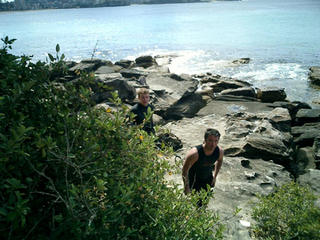
Then a Manly Surf Lifesaver came running from the club and made one of the thieves put the large nets and bags back into the ocean. There were beautiful tropical looking fish in there, blood dripping every where. I urged the lifesaver to inform the authorities, but he declined. When I finally got to a phone, the Fisheries Dept. was on hold - for ages - then an intelligent agent asked for specifics... A walk to council, referred on to the next phone to ring the ranger. There they wanted the identities and claimed Fisheries were responsible. There was that lunch time feeling in the air.
Almost daily there are people illegally collecting and destroying marine animals along this very small protected area. There are signs all along the way, that are self explanatory (images). The threatened fine is supposed to be $ 22,000. The enforcement seems to be outsourced to the public. It is really expected to face the 2 young men with their 2 m long weapons in a public place. Deliver 'their identities' to the relevant authorities in time.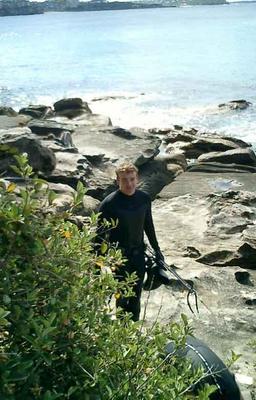
A protected area is only as protected if the law is effectively enforced. Citizens can cooperate, but must see positive effects to not lose confidence in the enforcing authorities.
This was not the only incident today, although it had commercial proportions, there was also someone scratching in the intertidal area with metal implements for living shellfish. There is usually more happening at night, as reported before
There is a possibility for commentary here, just in case anyone out there can identify the armed plunderers.
Click pictures for enlargement. There are many more..
Update: 08102008 Plundering-cabbage-tree-bay-marine again
22 August 2005
Enforcement of communities
 The deputy mayor recently encouraged residents to resolve their own problems by talking together, rather than asking for intervention by the Council or the courts. This is now becoming expected of residents. People are being forced into communities which negotiate their own rules.
The deputy mayor recently encouraged residents to resolve their own problems by talking together, rather than asking for intervention by the Council or the courts. This is now becoming expected of residents. People are being forced into communities which negotiate their own rules.
“All the people around here are nice, except you.”
Totalitarian government systems use local committees to enforce conformity with the “majority”. Deviation is not tolerated. Modern urban societies however tend to break down traditional relationships based on family and community. These are replaced with money-mediated relationships. Paid public organisations make laws and regulations which establish norms of behaviour. Neighbourhood bullying and the rights of the toughest do not belong to such a system.
Regulation of neighbourhoods needs to be distinct from personal relationships.
Local governments will try to save money by delegating their obligations but they have to avoid the civilised variations on lynching which are not uncommon in local communities.
A local community may decide that they all want to wash their cars or clear all the trees. But it is only an overarching and informed authority which can develop the larger perspective to control these activities to prevent the loss of all trees and the depletion of scarce water.
20 August 2005
Australian values
Values are the basis of all thought paradigms, reactions or actions towards nature or the other. Earl Mardle, a Sydney consultant summed them up about the Australian scene:
· Money is the measure of all things
· Possessions are the measure of your success
· Wasteful, unsustainable consumption is the greatest good
· Competition is the only way to achieve goodness in society, losers are inferior beings and its their own fault.
· Don't be a loser, whatever it takes
· Deny all evidence that you don't like or that doesn't fit your predetermined schema
· Physical prowess is more valued and rewarded than subtlety, intelligence, collaboration or sharing
· If at all possible, do not pay for anything.
This value repertoire was expressed in the context of the 'Travesty of Education'. There is more to read about the obstacles of such a value system and an inability to provide digital literacy.
Sustainability is impossible with such a value system.
19 August 2005
Usability of Manly
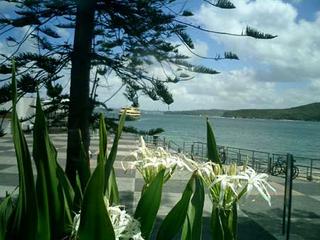 For years The Cove was the restaurant to have quality food in Manly. Arriving by ferry from some big apple, it provided the gateway to Manly as the predictable modern Greek seafood restaurant with wrap around harbour and National Park views. Occasionally ocean mammals could be sighted form the tables. Surrounded by competition now the stategy seems to be to lower quality: never innovate the menue, dated fish, smelly fries and hot milk for coffee. The word will be spread amongst local consumers.
For years The Cove was the restaurant to have quality food in Manly. Arriving by ferry from some big apple, it provided the gateway to Manly as the predictable modern Greek seafood restaurant with wrap around harbour and National Park views. Occasionally ocean mammals could be sighted form the tables. Surrounded by competition now the stategy seems to be to lower quality: never innovate the menue, dated fish, smelly fries and hot milk for coffee. The word will be spread amongst local consumers.
Tried out the Barking Frog, right at the beach. Willing to order breakfast, the cup of hot milk let the mood go sour. No wonder the review is a '100 % awful.'
A walk along Manly beach promenade was studded with huge building sites. Usually the surf overpowers all, but today, the cutters and pneumatic drills were the dominant soundscape. But the pulverised cement dust did not prevent the guests of the cafes to tuck in on the open road.
These developments are not sustainable for a tourist resort or for the local community. Extractive industries are the paradigm for commercial ventures or the common mind.The old case of 'use up and move on!'
15 August 2005
Wikipedia put Manly on the map
Manly is now on Wikipedia! It needs more filling in, but it is good to be on the map.
13 August 2005
Democracy and collective direction
 “The Council should do something about that!”
“The Council should do something about that!”
Is the local government a leading force in the area? Or does it only follow what the local community wants? Does the maintenance of a quality of life require active initiation by residents or can they be passive and expect the authorities to initiate actions to protect their life quality? Local government is an agency for the will of the community. They rarely initiate action. They respond to community pressure. If there is no community pressure, they will respond to other interests which exert pressure, such as the business community. In Manly, this group want to allow unlimited alcohol consumption right through the night, because they believe it is good for business. Drunks part with their money easily.
The community can exert pressure through elected representatives, whose role is to lead the local government. But without community support they will find this task difficult. Also, they are unable to raise all the issues which affect everyday life in a community. The other day I saw some resident (thinking of their own convenience but not of other people) had installed some powerful spotlights which blind all those who go walking on the Manly walkway to Cabbage Tree Bay at night. I thought “The council should do something about that!” But how would the administrators know? How would the elected representatives know? The only ones who could do anything would be those walking there, like me. The same applies to the other localised impacts on everyday life such as polluting cars, noisy vehicles, machine noise in the subs, and tree poisoning.
Often residents choose to be passive. The result is that the bullies determine life quality. Strong is right. Toughness prevails. The quality of life in the subs spirals gradually downwards. Local governments, in the interest of their own easy survival and secure employment, go along with the bully “consensus” only taking a tough stand on illegally parked vehicles and bicycles, or alternatively on those who make trouble by complaining.
Then the media wonders why there are bullies in schools.
10 August 2005
Projects to stay alive while moving about
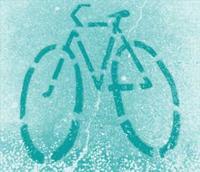 "...the car has become an article of dress without which we feel uncertain, unclad, and incomplete in the urban compound."
"...the car has become an article of dress without which we feel uncertain, unclad, and incomplete in the urban compound."
The Ghostcycles project in Seattle collects data from cyclists who have been involved in accidents. Patterns are established and action is taken. There is a Google map of all the places where cyclists were struck by cars, a form to report accidents and many useful links. In an auto-mobile culture like Australia such projects could aid in a transition to more sustainable means of transport. Some of the stats read like:
" 1 in 5 of the accidents involving another vehicle were hit-and runs"
" 74% of accidents resulted in physical injury and 35% resulted in damage to the bicycle 21% resulted in both. Only 13% of the accidents reported no damages."
There are many crosses and flowers lining roads in Sydney now, they seem to get denser and denser along the edge of the road. A mapping of the 'toll' could lead to changes or roads being blocked entirely to vehicles. There is even 'A Self-Help Program for Petro-Junkies'.
Birds coming and going...
Mostly unnoticed right in the busy Corso are the Figbirds (Sphecotheres viridis), seasonally visiting. Kookaburras even breeding successfully right on Manly beach. Soon their large old tree in which they nest will turn into a huge development site. With the old trees going and leaf litter blown away with noisy petrol machines they will have to set up 'Elsewhere'.
19.08.05 - There were six Figbirds sighted today eating white cedar fruit. They were very vocal, but no-one seem to notice them.
Enhancing ambience at Fairy Bower
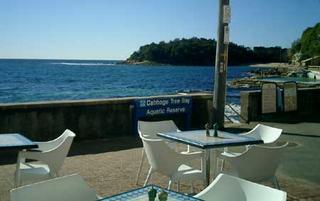 The Fairy Bower restaurant/café is one of the few places in Manly (Sydney?) where one can enjoy the Pacific directly and not have a noisy, stinking road separating the food and the ocean. The food and drinks are good, but the grumpy staff ensure the ordered goods get there cold or incomplete. Free expression of grumpiness ruins even the best of all natural environments. The ambience is ruined. This is a pity for a business that intends to be on the scene long-term and maintain a good reputation.
The Fairy Bower restaurant/café is one of the few places in Manly (Sydney?) where one can enjoy the Pacific directly and not have a noisy, stinking road separating the food and the ocean. The food and drinks are good, but the grumpy staff ensure the ordered goods get there cold or incomplete. Free expression of grumpiness ruins even the best of all natural environments. The ambience is ruined. This is a pity for a business that intends to be on the scene long-term and maintain a good reputation.
I suggest to eliminate the unpleasant interface between staff and customers, install Tablet PCs on the tables on which customers can compose their meals. On completion of the meal order, customers could pick up their (hot) dishes and optionally return the empty dishes. A personalised, competent service could be made available for a surcharge for digitally illiterate consumers or others desiring such a service. Such a business innovation would provide huge benefits for customers and the sustainablility of the business.
Update: 260807 The networked touch-screen sytem has been implemented in a restaurant now, saving personnel costs and keeping clientel in a good mood.
07 August 2005
Cabbage Tree Bay

Cabbage Tree Bay is one of Manly's nicest beaches. It is part of a marine reserve and is right next to Shelley Headland, an area of regenerated bushland. It is unusual for headlands in the city near beaches not to have houses packed onto them. This is the only west-facing beach in Sydney.
The bay was named after the cabbage tree palms which grew around the beach and up the creek. When Sydney was first colonised, the edible hearts of these beautiful palms were used for pig food and all the palms were cleared. All that remained of them was the name of the bay, and most people did not know why it had that name.
For the last several years, the Manly Council has been replanting cabbage tree palms at the beach and around the waterfront. Once again Cabbage Tree Bay has cabbage trees growing on it. Again there are palms on the beach where they belong.
Unfortunately, large motor boats have started using this bay as a parking lot on weekends, spoiling the visual unity of the bright blue water and the green headland and pumping petrol fumes into the fresh air where people are swimming.
06 August 2005
Beautiful beach, pity...
 Narrabeen beach is in the north of Manly, a long beach (3.2 km) with a row of houses, sliding into the ocean and a huge road right behind. The ocean water is of translucent tropical green, a few swimmers and surfies rolling in the gentle waves. From nowhere 3 jet-skies came flying over the waves at high speed, aiming right for the bodies of the swimmers. The petrol fumes stinking out the entire length of the beach for all walkers and residents. It is a wonder, that for the benefit of a few an entire beach can be used up. The patience of the surfies and swimmers is surprising, endangering their lives and not protesting. The tolerance of the house-owners to take the noise and fumes. But then, what the heck, if the whole house is sliding into the ocean! In the car-parks in between the houses, a shortage of space to park all the yob-mobiles with rockets at the back. The afternoon was just starting for a good bit of 'water sport'...
Narrabeen beach is in the north of Manly, a long beach (3.2 km) with a row of houses, sliding into the ocean and a huge road right behind. The ocean water is of translucent tropical green, a few swimmers and surfies rolling in the gentle waves. From nowhere 3 jet-skies came flying over the waves at high speed, aiming right for the bodies of the swimmers. The petrol fumes stinking out the entire length of the beach for all walkers and residents. It is a wonder, that for the benefit of a few an entire beach can be used up. The patience of the surfies and swimmers is surprising, endangering their lives and not protesting. The tolerance of the house-owners to take the noise and fumes. But then, what the heck, if the whole house is sliding into the ocean! In the car-parks in between the houses, a shortage of space to park all the yob-mobiles with rockets at the back. The afternoon was just starting for a good bit of 'water sport'...
05 August 2005
Lawn mowers
 Lawn mowers are not only a nuisance to neighbours, eliminating the peace and quite and filling the air with unpleasant-smelling and unhealthy gases. They are also a disaster for the environment.
Lawn mowers are not only a nuisance to neighbours, eliminating the peace and quite and filling the air with unpleasant-smelling and unhealthy gases. They are also a disaster for the environment.
One 2-stroke mower pumps out as much carbon-dioxide in an hour as 200 cars. A four-stroke mower isn't quite so bad in that respect, but adds considerably to ground level ozone causing summer smog.
Electric mowers are an alternative that may contribute to peace and quiet and have less impact on the atmosphere. Battery mowers are a more convenient variant without cables.
The best option of all is not to have a lawn. Growing other plants which do not need cutting is more pleasant to look at and creates a sustainable green space for enjoyment without noise. The most suitable plants are those endemic to the local area which will also support the local wildlife.
04 August 2005
The End of Suburbia
 Unimaginable, the beautiful castles, the endless lawns and interesting shopping malls should all be out of reach. The sprawl will grind to a halt with the end of oil. Watch some of the previews of The End of Suburbia (DVD), the beginning of the end of the subs, petrol depletion and the end of the ozzie dreaming, war to fill up that sub-urban tank. Surely they will have to come up with something to put into my tank!
Unimaginable, the beautiful castles, the endless lawns and interesting shopping malls should all be out of reach. The sprawl will grind to a halt with the end of oil. Watch some of the previews of The End of Suburbia (DVD), the beginning of the end of the subs, petrol depletion and the end of the ozzie dreaming, war to fill up that sub-urban tank. Surely they will have to come up with something to put into my tank!
Cuttle 'fish' all over Shelley beach
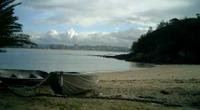 A walk on Shelley beach (03.08) at night exposed a beach littered in cephalopoda, you might know it as the "stuffed with…thing". Approximately 13 white cuttle 'fish' each 30- 40 cm long were lying all over the beach. 'Natural stranding?' They have been around for some 542 million years now and are still performing their rituals in the protected Cabbage Tree Bay area. Many large boats came right in in the last days and went about their 'business'. These strandings go unreported. Bait?,boat chemicals or just tangled in nets?
A walk on Shelley beach (03.08) at night exposed a beach littered in cephalopoda, you might know it as the "stuffed with…thing". Approximately 13 white cuttle 'fish' each 30- 40 cm long were lying all over the beach. 'Natural stranding?' They have been around for some 542 million years now and are still performing their rituals in the protected Cabbage Tree Bay area. Many large boats came right in in the last days and went about their 'business'. These strandings go unreported. Bait?,boat chemicals or just tangled in nets?
Some more images and information is here. Detailled scientific illustrations of anatomy and morphology of Sepia officinalis are here.
Hello golfer!
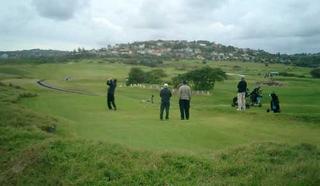 The Northern Beaches are studded with golf courses. Headlands have been cleared, lagoons and water-ways provide handy elimination of undesirable substances. The club houses are manicured to not get those white shoes soiled. The consumers of these services do not ask themselves what the negative impact is on the environment or their future generations. The need for hundreds of large cars to park, the industrial and chemical treatment of the large area. The noise scape created by industrial machinery. The ecological and economic impacts on the direct neighbourhoods. Responsible people would ask their 'recreational club' for a sustainability accounts. Make an informed consumer choices that does not negatively impact on people, fauna and flora.
The Northern Beaches are studded with golf courses. Headlands have been cleared, lagoons and water-ways provide handy elimination of undesirable substances. The club houses are manicured to not get those white shoes soiled. The consumers of these services do not ask themselves what the negative impact is on the environment or their future generations. The need for hundreds of large cars to park, the industrial and chemical treatment of the large area. The noise scape created by industrial machinery. The ecological and economic impacts on the direct neighbourhoods. Responsible people would ask their 'recreational club' for a sustainability accounts. Make an informed consumer choices that does not negatively impact on people, fauna and flora.
- It takes some 2.5 billion gallons per day to irrigate the world's golf courses, the same amount could be used to provide 4.7 billion people with the UN minimum of fresh water required.
- There are 18.0 pounds of pesticides used per acre annually in golf courses.
- Agriculture uses 2.7 pounds of pesticide per acre.
02 August 2005
Penguins or dogs?
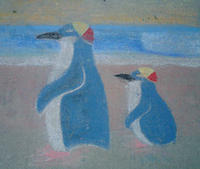 Read in the local paper recently that a resident cemented out the breeding hole of Manly little penguins. Today it was reported, that 2 dogs killed 15 of these little penguins in Tasmania, right in front of all the tourists who came to see them. (SMH 2.8.05, p.4)
Read in the local paper recently that a resident cemented out the breeding hole of Manly little penguins. Today it was reported, that 2 dogs killed 15 of these little penguins in Tasmania, right in front of all the tourists who came to see them. (SMH 2.8.05, p.4)
In the Harbour and at North Head speed boats have been racing (senselessly) endangering these diving birds. Dogs are allowed to go almost anywhere in Manly, either mostly unsupervised or free range on the beach at night or in possible penguin habitats.
Beyond rational decision-making, the residents seem to vote for dogs, rather than encouraging the diversity of unique animals in their 'back-gardens'. This is a consuming of the local habitat and degrading the value for any potential 'tourist-industry'. It is unsustainable, ecologically and economically.





